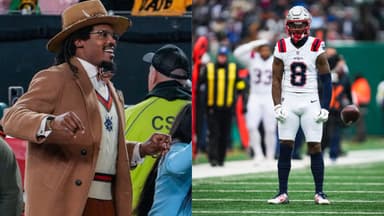Cam Newton was a Florida Gator to start with, long before he became a superstar, winning the 2010 Heisman Trophy playing for Auburn, which led to him becoming the No. 1 overall pick in the 2011 NFL draft, and earning a contract potentially worth $100 million from the Carolina Panthers. And Newton possessed the same spark in Florida that he displayed throughout his career. But there were some flaws too.
Advertisement
Newton wasn’t always the best teammate, for instance. As one former teammate, cornerback Markihe Anderson, put it, Newton had “some goofiness to him” that played out on the Florida practice field.
“He wasn’t always putting his best foot forward [as a backup]. Guys would always speak to him, remind him to take things seriously,” former Gators running back Brandon James had revealed once. Even Newton admits to being “a great player, but a terrible teammate.” So what does he think was the problem?
According to the former Panthers quarterback, he “never lashed out.” But he wasn’t good at one thing: “Expressing myself to my teammates,” confessed Cam.
Over two years, Newton gave Florida 113 rushing yards and 54 passing yards in spot duty. However, his pouting on the sidelines and sulking in press conferences after losing became an issue. It appeared at times during his NFL career, too.
Receiver Steve Smith once took matters into his hands after the Panthers were decimated by the New York Giants in 2018 and gave Newton a piece of his mind.
“I watched D.A. and Jimmy [Clausen], they don’t play in 20-something games last year. And they get up and they observe and learn and get those mental reps… I told him, ‘You can get some mental reps or you can sit on that bench and sulk,’” said Smith.
The guidance of more mature and experienced players like Mike Shula and Smith eventually got Newton to fix his ways to an extent. It sorted not only his game but also his attitude.
“Steve Smith was a firecracker who played with an edge. He spoke my language like that. Like how to represent yourself and how to have a chip on your shoulder. I learned from those guys. Marty Hearnie. Coach Rivera and then even Coach Shula. These guys invested a lot of grace and patience during that time,” said Newton.
At 36 years of age, Newton has no problem admitting that he was immature and childish in how he carried himself throughout his high school and college years. Losing wasn’t easy for Newton, who got used to being undefeated.
While his early years were marked by flashes of brilliance overshadowed by poor attitude and immaturity, Newton eventually evolved into a leader. That’s thanks in large part to the tough love and mentorship of veterans like Steve Smith and coaches who believed in his potential.







